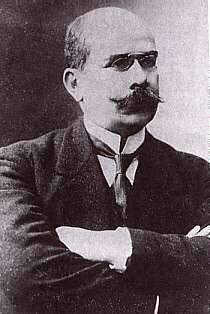A. L. M. Nicolas
Alphonse Louis Marie Nicolas (1864-1939)—better known by his pen name A. L. M. Nicolas—was a Persian-born French historian and orientalist who is best known today for his early work on Shaykhism and Bábism. Although primarily remembered for his academic contributions, Nicolas worked as an interpreter and diplomat with the French Consular Service in Persia for most of his life. Nicolas was among the first Western Orientalists to devote substantial attention to the life and teachings of the revolutionary Persian religious figure known as the Báb, and his work continues to serve as an important source for the study of the early history of Shaykhism, Bábism and the Bahá'í Faith.
A. L. M. Nicolas | |
|---|---|
 | |
| Born | Alphonse Louis Marie Nicolas 27 March 1864 |
| Died | 28 February 1939 |
| Occupation | Interpreter, diplomat, historian |
| Parent(s) |
|
Biography
Nicolas was born on 27 March 1864, in Rasht, in the Gilan Province of Iran where his father was stationed with the French Consular Service in Persia. As a young man he learned to speak French, Persian and Russian, going on to study at the Special School for Oriental Languages in Paris. After his studies, Nicolas followed his father’s footsteps, joining the consular services in which he served as leading Persian interpreter.[1]
An ongoing disagreement between Nicolas’s father and Arthur de Gobineau—secretary and chargé d’affarires at the French legation in Persia, who would go on to be an influential orientalist[2]—led Nicolas to read Gobineau’s book Les Religions et Les Philosophies dan l'Asie Centrale. While Nicolas agreed with his father’s assessment of Gobineau’s work as riddled with errors resulting from Gobineau’s limited grasp of Persian and lack of research acumen, it was through this work that he was first exposed to the life and teachings of the Báb. As a result of his research, Nicolas befriended an employee of the consulate who was a member of the Bahá’í Faith, and who assisted him to meet local Bábís and Bahá’ís.[3]
As Nicolas continued studying, his interest did not remain purely academic. He developed friendships with local members of the two religions, and undertook to translate a selection of Bábí scriptures. Over the course of translating the Báb’s Persian Bayán and Dalá'il-i-Sab'ih (The Seven Proofs) from Persian to French, he developed a growing appreciation for the teachings and person of the Báb, came to identify as a follower of the Báb, or a Bábí. In a 1939 interview, he described this experience:
"I had resolved to translate the "Persian Bayán". I admit that during the two or three years of my study [of that book] I was often dazzled by the explanations that the Báb gives us for certain mysteries such as death, the resurrection, the Sirát — this bridge that passes over hell, narrow as a hair, sharp as a razor, and which the believer traverses with the rapidity of lightning. These explanations pleased me and I exerted myself more and more in my work. I only regret having neglected the translation of the majority of the Writings that issued forth from the pen of the Prophet.
"Also, in reading the "Book of the Seven Proofs", which I translated, I was seduced by the clarity of reasoning of the Báb. I was aided in my work by a young Persian and every day in the afternoon we went walking outside the town leaving through the gate of Shimran. The purity of the air, the serenity, the softness of the temperature and, in certain seasons, the perfume of the acacias predisposed my soul to peace and to tenderness. The meditations that I had upon the strange book I was translating filled me with a kind of intoxication and I became bit by bit profoundly and uniquely a Bábí. The more I plunged into these meditations the more I admired the exalted genius of the one who, born in Shíráz, dreamed of uplifting the Muslim world; and [his] explanation of the meaning of the language of Shí'í belief impelled me gradually to write "Seyyed Ali Mohammed dit le Báb".— A. L. M. Nicolas, 1939 Interview by Edith Sanderson
Notes
- Momen 1981, p. 36.
- Irwin 2016, p. 323.
- Momen 1981, p. 37.
- Sanderson 1942, pp. 885-886, translated in Terry (2015, p. 5)
References
- Irwin, Robert (January 2016). "Gobineau The Would be Orientalist". The Journal of the Royal Asiatic Society. 26.CS1 maint: ref=harv (link)
- Momen, Moojan (1981). "The Work of A.L.M. Nicolas (1864-1937)". The Bábí and Bahá'í Religions: Some Contemporary Western Accounts. Oxford: George Ronald. p. 603. ISBN 9780853981022.CS1 maint: ref=harv (link)
- MacEoin, Denis (1992). The Sources for Early Bābī Doctrine and History: A Survey. Leiden: E.J. Brill. ISBN 9004094628.CS1 maint: ref=harv (link)
- Sanderson, Edith (1942). "An Interview with A. L. M. Nicolas of Paris". In National Spiritual Assembly of the Bahá'ís of the United States and Canada (ed.). The Bahá'í World. Volume I of the Babi Studies Series. 8. New York: Bahá’í Publishing Committee. ISBN 978-1-4357-1495-3.CS1 maint: ref=harv (link)
- Nicolas, A. L. M. (2015). Terry, Peter (ed.). A Prophet in Modern Times (Seyyed Ali Mohamed dit le Báb). Volume I of the Babi Studies Series. Translated by Terry, Peter (2nd ed.). bahai-library.com. ISBN 978-1-4357-1495-3.CS1 maint: ref=harv (link)
- Uskui, Haji Mírzá Haydar Ali (August 2003). Translated by Manuchehri, Sepehr. "Monsieur Nicolas - the French: Extracts from Tarikh-i Azarbayan (pp 96-110)". Translations of Shaykhi, Babi, and Baha'i Texts. 7 (2). Retrieved October 9, 2018.CS1 maint: ref=harv (link)
